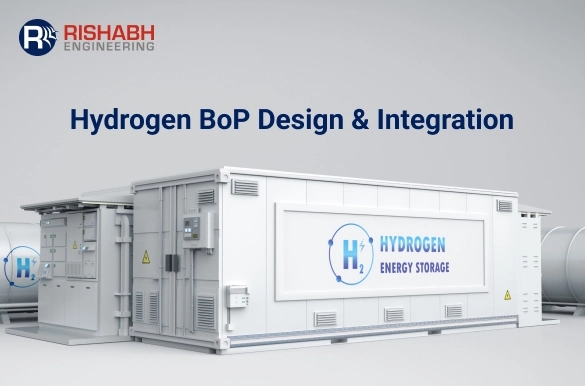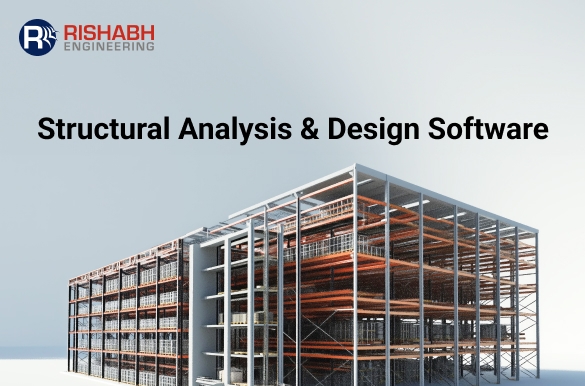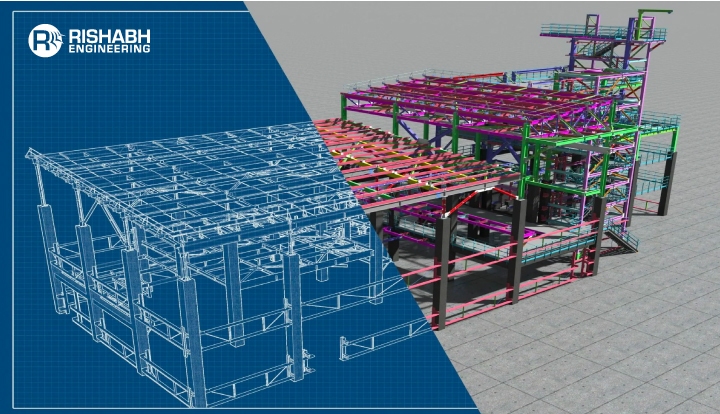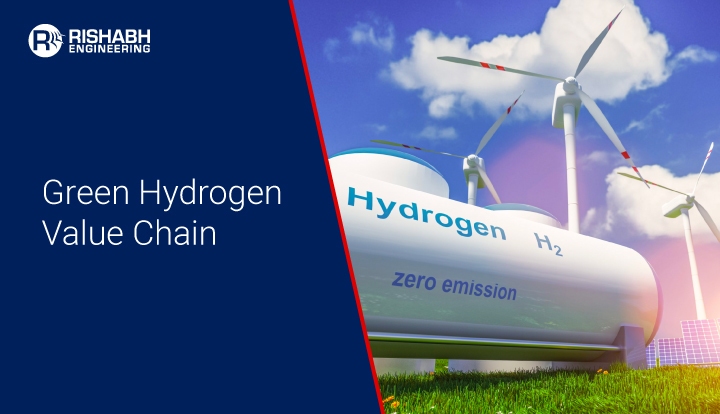
Hydrogen BoP Design: Considerations, Tools, Challenges & Solutions
Ensuring Hydrogen systems’ smooth, secure, and productive functioning is crucial as the industry embraces on this energy source for a low-carbon future. To fully realize hydrogen’s potential as a sustainable energy source, its Balance of Plant (BoP), or the systems and components that enable core hydrogen production, must be designed and integrated effectively. Various engineering specialties are needed to handle this intricate operation, including structural, mechanical, electrical, process, and instrumentation. A multidisciplinary design engineering firm is uniquely positioned to combine these elements into a coherent system, helping clients navigate technical and regulatory obstacles to create safe, workable hydrogen packages that meet the strict industry requirements.

This article looks at the critical elements of Hydrogen BoP, essential design factors, and the function of multidisciplinary engineering knowledge in guaranteeing effective, secure, and economic systems.
Understanding Hydrogen BoP
It would refer to all the auxiliary components and systems necessary to support the core hydrogen production process—whether through electrolysis, steam methane reforming, or other methods. These components include:
- Piping and pipelines for transporting hydrogen.
- Compressors, chillers, and pumps to regulate pressure, temperature, and flow rates.
- Heat exchangers for maintaining optimal thermal conditions.
- Storage vessels and tanks for hydrogen containment.
- Power systems and control systems to monitor and control operations.
Designing and integrating these components requires a holistic approach to ensure that the BoP complements the primary hydrogen production unit without introducing inefficiencies or safety risks.
Multidisciplinary Collaboration In Hydrogen Balance Of Plant Design Projects
Because Hydrogen BoP components are interrelated, a multidisciplinary engineering team is necessary. The cross-functional team method used by Rishabh Engineering guarantees that every element of the design functions in unison while considering operational performance, safety, cost-effectiveness, and environmental impact.
Core Design Engineering Disciplines:
- Process Engineering: Defines the flow, pressure, and temperature requirements within the BoP, specifying parameters for equipment like pumps, compressors, and heat exchangers.
- Mechanical Engineering: Responsible for selecting and sizing equipment based on the load and operational conditions, considering material properties suited for high-pressure hydrogen applications.
- Structural Engineering: Ensures the physical support and stability of the BoP components, especially considering the challenges of hydrogen containment and transport under varying pressure and temperature conditions.
- Electrical Engineering: Creates backup power sources and power distribution systems to guarantee dependable, ongoing operation.
- Instrumentation and Controls (I&C): Develops I&C monitoring and control systems to ensure smooth operation & real-time adjustments in response to process conditions
Key Design Considerations for Hydrogen BoP
Because of its special characteristics, including its low molecular weight, strong diffusivity, and potential flammability, hydrogen requires certain design approaches to be handled safely and effectively.
- Material Selection for Hydrogen Containment: Because hydrogen can lead to material embrittlement, pipes, tanks, and connectors must be made with the proper materials. Common materials, such as carbon steel, may not withstand the high-pressure, high-purity hydrogen environments and may require specialized alloys or coatings. Materials must be carefully chosen based on stress-strain requirements, temperature tolerance, and compatibility with hydrogen. Multidisciplinary teams use material expertise at Rishabh Engineering to maximize long-term durability while taking the entire lifecycle cost into account.
- Leak Prevention and Detection: Hydrogen’s low molecular weight makes it easy for it to escape containment systems, posing a safety risk. This makes leak prevention and detection crucial. Designing effective containment requires sealing technologies and continuous monitoring systems for early leak detection. Rishabh Engineering integrates advanced sensor technology and automated control systems to detect leaks promptly, especially in areas like flanges and connectors, where hydrogen leaks are most likely.
- Thermal Management: Hydrogen systems involve complex temperature dynamics, especially in applications like fuel cells and electrolysis. To ensure optimal efficiency and safety, the engineering team designs heat exchangers and cooling systems to manage heat generated during operation. Effective thermal management minimizes energy loss, boosts performance, and helps meet safety regulations by preventing overheating or condensation in low-temperature operations.
- Flow Dynamics and Pressure Control: Hydrogen BoP designs must regulate flow and pressure to maintain stable operations. With fluctuating demands and production rates, the system needs flexible controls to adjust pressure dynamically. Engineering teams optimize valve placement and design pressure relief systems that can handle surges without compromising safety or efficiency. This also involves flow rate predictions to maintain system stability under different operating conditions.
- Compliance with Industry Standards: Hydrogen systems are subject to stringent regulations, such as the ASME B31.12 code for hydrogen piping and pipelines. Multidiscipline engineering firms ensure that the said designs meet local and international safety and quality standards. By aligning designs with regulatory requirements, our team supports clients mitigate compliance risks and achieve safety certifications crucial for operational approval.
Software Tools and Modeling Techniques in Hydrogen BoP Design
Effective Hydrogen BoP integration & design requires advanced modeling tools to simulate real-world conditions. Rishabh Engineering utilizes digital platforms like CADWorx, NavisWorks, ANSYS and CAESAR II to visualize, simulate, and refine the design thus addressing potential issues before construction begins.
- 3D Modeling and Simulation: Software such as CADWorx and NavisWorks enables comprehensive 3D modeling of layouts, allowing engineers to visualize spatial requirements and identify potential bottlenecks. Simulating the system’s operation enables proactive adjustments for thermal expansion, pressure changes, and structural stability.
- Pipe Stress Analysis: CAESAR II allows detailed pipe stress analysis to prevent failure due to high-pressure hydrogen movement. By identifying and correcting weak points, engineers at Rishabh Engineering enhance the safety and durability of designs.
- Control System Simulations: I&C engineers use simulation tools to test control strategies, ensuring seamless integration of control algorithms and feedback systems for pressure and temperature regulation.
Challenges & Solutions in Hydrogen BoP Integration
Hydrogen BoP systems present specific challenges that require innovative solutions from multidisciplinary engineering teams.
- Scalability and Modularization: Scaling hydrogen systems to different production levels often requires modular design approaches. A modular structure can be expanded or reconfigured with minimal disruption to ongoing operations. Systems may be scaled up as demand rises thanks to Rishabh Engineering’s application of modular design concepts, which guarantees affordable extensions that meet future growth needs.
- Integration with Renewable Energy Sources: As renewable energy sources proliferate; hydrogen production frequently depends on variable energy inputs like wind and solar power. Hydrogen BoP integration with renewable energy necessitates sophisticated control systems to moderate erratic power flows.
- Safety Management: Safety is paramount in hydrogen systems, and BoP components must meet strict safety criteria. Rishabh Engineering employs quantitative risk assessments (QRA) to evaluate potential hazards, and advanced fire protection systems are integrated to prevent and contain fire incidents. This comprehensive safety strategy includes placing emergency shutdown systems and ensuring rapid response to incidents.
How Rishabh Engineering Adds Value to Hydrogen BoP Projects?
A multidisciplinary engineering approach provides comprehensive, integrated solutions that address every project lifecycle phase. Our hydrogen engineering consultants adopt an interdisciplinary approach to deliver comprehensive, integrated design packages that support clients throughout the project lifecycle, particularly in designing and integrating hydrogen balance of plant systems.
By leveraging the collective expertise of our team, we ensure projects are executed with precision, safety, and efficiency. Here’s how we help:
- Customized Design Packages: We provide custom packages that align with each project’s unique requirements and constraints. Our expertise extends to optimizing system layouts, utility consumption, and creating isolated spaces for critical components—from initial concept development to detailed design and execution.
- Advanced Engineering Software Tools: Our team utilizes leading digital platforms and engineering tools & software to accelerate the design process, enhance accuracy, and reduce project timelines. This includes validating inputs, managing I/O integration, and ensuring seamless integration of safety systems within the project framework.
- Compliance and Safety Expertise: We prioritize adherence to industry standards by embedding compliance and safety considerations from the initial design stages. Whether securing statutory approvals (both local and international) or ensuring that systems meet regulatory norms, we proactively address risks of non-compliance.
- End-to-End Project Support: Rishabh Engineering offers holistic support from conceptual design, feasibility analysis, and layout development to detailed engineering and execution. This includes generating RFQs for equipment (both bought and fabricated), producing construction diagrams, and integrating safety protocols. Our multidisciplinary teams ensure that every aspect—such as project safety, space isolation, and utility management—is meticulously managed for optimal project delivery.
Combining our technical expertise with a deep understanding of project-specific needs in Hydrogen BoP engineering allows us to support clients bring their initiatives to life efficiently, safely, and fully comply with regulatory standards.
Final Words
Successfully designing and integrating a hydrogen BoP requires more than technical knowledge; it demands a cohesive approach considering process engineering, structural integrity, electrical power distribution, and real-times control systems. By leveraging detail engineering services across multiple disciplines, companies like Rishabh Engineering have the required technical knowledge from various technical specialties to create safe, effective, and reliable hydrogen systems suited to today’s energy demands and tomorrow’s sustainability objectives. The development of robust, future-ready hydrogen infrastructure will be a crucial function of multidisciplinary design engineering firms as hydrogen continues to take center stage in the global energy scenario.
Seek Help with Hydrogen BoP Design & Integration?
Our multidisciplinary team ensures optimized performance in BoP design and integration, supporting your green hydrogen projects from design to execution.
Related Blogs
Related Blogs
Best Structural Engineering Software for Accurate Analysis
Finding tools that simplify and improve the accuracy of the…
Detailed Engineering Considerations for Project Success
Engineering projects today require meticulous planning and execution across various…


